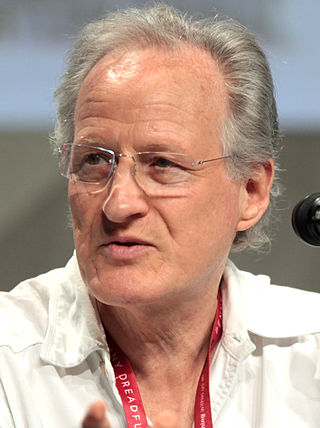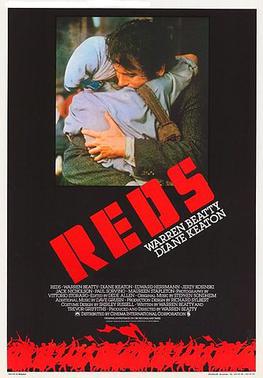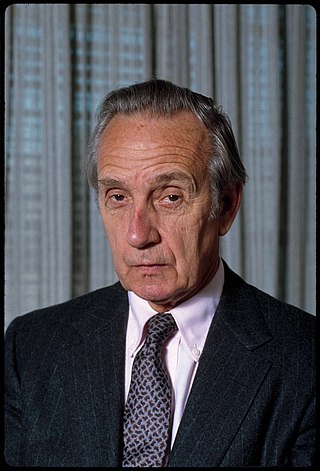Related Research Articles

Michael Kenneth Mann is an American film director, screenwriter, author, and producer, best known for his stylized crime dramas. Mann has received numerous accolades including a BAFTA Award and two Primetime Emmy Awards as well as nominations for four Academy Awards and two Golden Globe Awards. His most acclaimed works include the films Thief (1981), Manhunter (1986), The Last of the Mohicans (1992), Heat (1995), The Insider (1999), Ali (2001), Collateral (2004), and Public Enemies (2009). He is also known for his role as executive producer on the popular TV series Miami Vice (1984–89), which he adapted into a 2006 feature film.

Reds is a 1981 American epic historical drama film, co-written, produced, and directed by Warren Beatty, about the life and career of John Reed, the journalist and writer who chronicled the October Revolution in Russia in his 1919 book Ten Days That Shook the World. Beatty stars in the lead role alongside Diane Keaton as Louise Bryant and Jack Nicholson as Eugene O'Neill.

Paolo Soleri was an Italian-born American architect. He established the educational Cosanti Foundation and Arcosanti. Soleri was a lecturer in the College of Architecture at Arizona State University and a National Design Award recipient in 2006. He coined the concept of 'arcology' – a synthesis of architecture and ecology as the philosophy of democratic society. He died at home of natural causes on 9 April 2013 at the age of 93.
David Holzman's Diary is a 1967 American mockumentary, or work of metacinema, directed by James McBride and starring L. M. Kit Carson. A feature-length film made on a tiny budget over several days, it is a work of experimental fiction presented as an autobiographical documentary. "A self-portrait by a fictional character in a real place—New York's Upper West Side," the film comments on the title character's personality and life as well as on documentary filmmaking and the medium of cinema more generally. In 1991, David Holzman's Diary was included in the annual selection of 25 motion pictures added to the National Film Registry of the Library of Congress, being deemed "culturally, historically, or aesthetically significant" and recommended for preservation.
Cinéma vérité is a style of documentary filmmaking developed by Edgar Morin and Jean Rouch, inspired by Dziga Vertov's theory about Kino-Pravda. It combines improvisation with use of the camera to unveil truth or highlight subjects hidden behind reality. It is sometimes called observational cinema, if understood as pure direct cinema: mainly without a narrator's voice-over. There are subtle, yet important, differences between terms expressing similar concepts. Direct cinema is largely concerned with the recording of events in which the subject and audience become unaware of the camera's presence: operating within what Bill Nichols, an American historian and theoretician of documentary film, calls the "observational mode", a fly on the wall. Many therefore see a paradox in drawing attention away from the presence of the camera and simultaneously interfering in the reality it registers when attempting to discover a cinematic truth.

Ralph Johnson Bunche was an American political scientist, diplomat, and leading actor in the mid-20th-century decolonization process and US civil rights movement, who received the 1950 Nobel Peace Prize for his late 1940s mediation in Israel. Among black Nobel laureates he is the first African American and first person of African descent to be awarded a Nobel Prize. He was involved in the formation and early administration of the United Nations, and played a major role in both the decolonization process and numerous UN peacekeeping operations.

Ida Lupino was a British actress, director, writer, and producer. Throughout her 48-year career, she appeared in 59 films and directed eight, working primarily in the United States, where she became a citizen in 1948.

William Garfield Greaves was an American documentary filmmaker and a pioneer of film-making. After trying his hand at acting, he became a filmmaker who produced more than two hundred documentary films, and wrote and directed more than half of these. Greaves garnered many accolades for his work, including four Emmy nominations.

Paris Is Burning is a 1990 American documentary film directed by Jennie Livingston. Filmed in the mid-to-late 1980s, it chronicles the ball culture of New York City and the African-American, Latino, gay, and transgender communities involved in it.

Major Sir Brian Edward Urquhart was a British international civil servant and World War II veteran, and author. He played a significant role in the founding of the United Nations. He went on to serve as its Under-Secretary-General for Special Political Affairs.
The 40th National Society of Film Critics Awards, given on 7 January 2006, honored the best in film for 2005.
Robert Lincoln Drew was an American documentary filmmaker known as one of the pioneers—and sometimes called father—of cinéma vérité, or direct cinema, in the United States. Two of his films, Primary and Crisis: Behind a Presidential Commitment, have been named to the National Film Registry of the Library of Congress. The moving image collection of Robert Drew is housed at the Academy Film Archive. The Academy Film Archive has preserved a number of his films, including Faces of November, Herself: Indira Gandhi, and Bravo!/Kathy's Dance. His many awards include an International Documentary Association Career Achievement Award.

Symbiopsychotaxiplasm: Take One is a 1968 American experimental documentary film written, directed, co-produced and edited by filmmaker and documentarian William Greaves. The film is shot and presented in the style of a cinéma vérité documentary, attempting to capture and examine pure reality unhindered by the presence of the cameras all around. It is notable for the inherent layers of metatextual storytelling, with a documentary inside a documentary inside a documentary.

Mehrdad Oskouei is an Iranian independent film producer, film director, screenwriter of documentary films and film educator.
Greaves is an English surname. Notable people with the surname include:
Reza Farahmand is an Iranian film director, most known for documentary films.
Archambault is a surname. Notable people with the name include:
Souls of Sin is a 1949 American race film written and directed by Powell Lindsay, and produced by William D. Alexander.
Modernist film is related to the art and philosophy of modernism.
Ralph Bunche: An American Odyssey was an American 2001 documentary film by William Greaves. It was the first in-depth documentary film that was produced on the life and legacy of Ralph Bunche, an African-American diplomat and the first person of color to win the Nobel Peace Prize.
References
- ↑ "BIOGRAPHY OF LOUISE ARCHAMBAULT GREAVES". williamgreaves.com. Retrieved 25 September 2023.
- 1 2 "Louise Archambault". IMDb. Retrieved 25 October 2018.
- ↑ "filmforum.org/events/event/symbiopsychotaxiplasm-take-1-introduced-by-louise-greaves-event". filmforum.org. Retrieved 25 October 2018.
- 1 2 "Symbiopsychotaxiplasm: Take 2 1/2 - Full Frame Documentary Film Festival". fullframefest.org. Retrieved 25 October 2018.
- 1 2 "Ida B. Wells: A Passion for Justice. Prod. by William Greaves and Louise Archambault. William Greaves Productions, 1990. 53 mins. (William Greaves Productions, 230 Fifty-fifth St., 26th Floor, New York, NY 10019) | Journal of American History | Oxford Academic". academic.oup.com. Retrieved 25 October 2018.
- ↑ Archambault, Louise; Greaves, William; Poitier, Sidney; Urquhart, Brian; Filmakers Library, Inc; Alexander Street Press, (issuing body.) (2001), Ralph Bunche : an American odyssey, Filmakers Library, retrieved 25 October 2018
- ↑ "Film Screening and Discussion: Ida B. Wells: A Passion for Justice - NYU Institute of African American Affairs". nyuiaaa.org. Retrieved 25 October 2018.
- ↑ "Conversations.org: Paolo Soleri: Architecture as Salvation, by Richard Whittaker". conversations.org. Retrieved 1 November 2018.
- ↑ "The Daring, Original, and Overlooked "Symbiopsychotaxiplasm: Take One"". The New Yorker. Retrieved 25 October 2018.
- ↑ "Movie of the Week: "Symbiopsychotaxiplasm: Take One"". The New Yorker. Retrieved 25 October 2018.
- ↑ "Dialogic: Audra Wolowiec: On "Symbiotaxiplasm"". dialogic.blogspot.com. 7 August 2008. Retrieved 25 October 2018.
- ↑ "Discovering William Greaves (Video 2006)". IMDb. Retrieved 25 October 2018.
- ↑ "50 Years Later, We Still Don't Know Whether This Film Is Fact or Fiction". hyperallergic.com. 16 February 2018. Retrieved 25 October 2018.
- ↑ "Ralph Bunche | Making the Film | About the Film". pbs.org. Retrieved 25 October 2018.
- ↑ "Symbiopsychotaxiplasm: Take One - Awards". IMDb. Retrieved 25 October 2018.